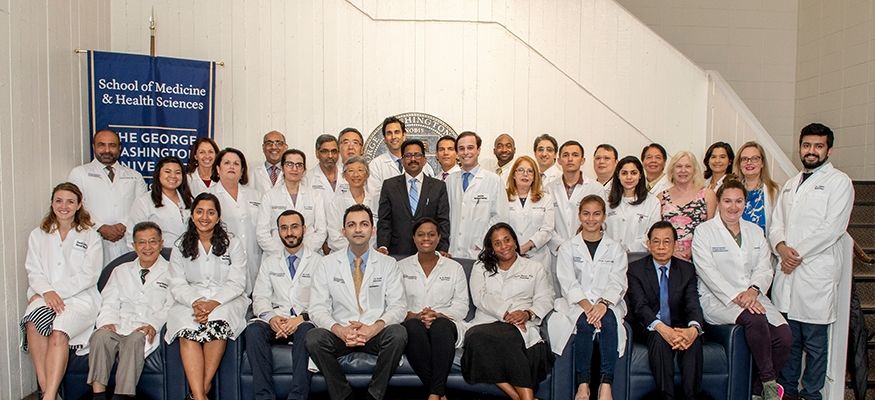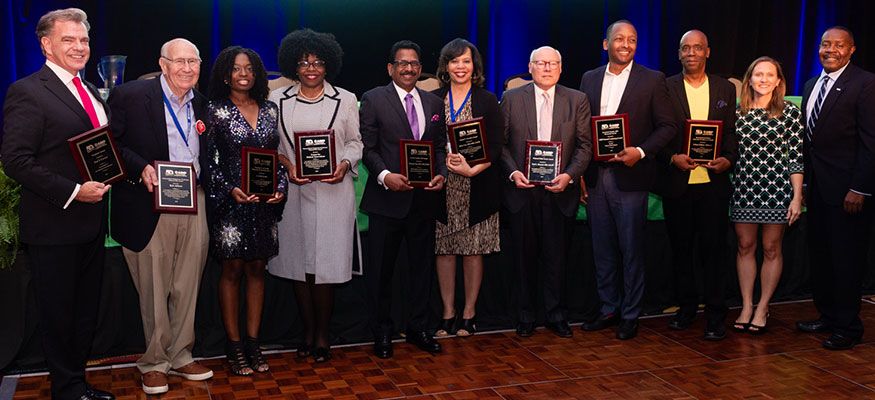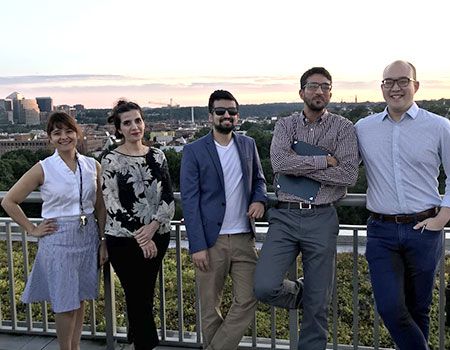The Division of Kidney Diseases and Hypertension at the George Washington University (GW) School of Medicine has a long and distinguished history of remarkable achievements in scientific discovery and clinical care of kidney disease. GW School of Medicine was founded in 1824 as a medical department in Columbian College, now called The George Washington University. The GW School of Medicine and Health Sciences is the first in the nation’s capital and is the 11th oldest in the nation.
The nephrologist at GW have been pioneers in the field. GW purchased its first artificial kidney--a "Kolff Kidney“ to provide lifesaving dialysis in 1965, only two years after it was introduced in the United States. In 1964, Alvin Parrish, MD, the inaugural chief of nephrology at the GW opened Washington's first non-military outpatient dialysis unit. The division led the way in diagnostic kidney biopsy and Stephen Dosa, MD established plasmapheresis service in 1981 for the entire region. Norman Kramer, MD (nephrologist) established the human leukocyte antigen (HLA) laboratory and began the kidney transplant program in 1976. The division gained national and international reputation under the leaderships of Anne Thompson, MD, Juan P Bosch, MD, Paul L Kimmel, MD, and Susie Q Lew, MD. The division made remarkable strides in science contributing to our understanding of mineralocorticoid activity in the kidney, continuous renal replacement therapies, diet in kidney disease (MDRD study) HIV nephropathy, acute kidney injury, inflammation in hemodialysis, psychosocial aspects of kidney disease, pharmacogenomics and telemedicine.

I assumed responsibility as the division chief in 2009 and continued the strong tradition of discovery through research in molecular epidemiology, inflammation, microbiome and metabolome. The division participated in several key NIH funded projects including the Systolic Blood Pressure Intervention Trial (SPRINT) and led the way in microbiome research through the “Novel Therapies in Hemodialysis Consortium” and the “Pilot Studies in CKD consortium”. We also participate in Canadian-Australasian Randomized Trial Of Screening Kidney Transplant Candidates for Coronary Artery Disease (CARSK), Cardiac Arrhythmia Monitoring and Related Outcomes in End Stage Renal Disease Patients (CAMRO-ESRD) and APOL1 Long term kidney transplantation outcome Network (APOLLO). Pedro A Jose, MD, PhD a world-renowned expert in hypertension joined the division and is pursing research on personalized treatment for hypertension.
On the clinical side, we re-established the kidney transplant program in 2014, which was closed for more than 2 decades. Several sub-nephrology specialty clinics were launched during my tenure, including glomerular diseases clinic, an onconephrology clinic, a complex hypertension clinic, a nutrition based group medical clinic and an ultrasound clinic. We expanded the provision of extracorporeal therapies to include plasmapheresis, leukapheresis and exchange transfusion. We boast of the largest peritoneal dialysis program and the faculty now serve as medical directors for 5 dialysis units in the DC, Maryland and Virginia area. The Division was recognized by the US News and World report as “High performing” a distinction held by the top ten percent of nephrology divisions in the country.
Distinguished faculty members from the division are recognized for their research, clinical expertise and health care policy experience in national and international forums. The division partnered with the American Association of Kidney Patients (AAKP) and hosted the inaugural Global Summit in Patient Centered Kidney Care in 2019, which was a tremendous success. Dr. Paul Kimmel received the Belding H. Scribner Award from the American Society of Nephrology for his contribution to nephrology and the AAKP’s National Public Service Award. Dr. Pedro Jose received several awards, including the Ernest H. Starling Distinguished Lecturer from the American Physiological Society and the Excellence Award for Hypertension Research from the American Heart Association. Recognizing the important work done in the division, I was named “Innovator in Nephrology” and later received the Peter Lundin Award from the AAKP, one of the highest honors presented to physicians for their significant contributions to the care of kidney patients.

The division cherishes our partnership with the DC Veterans Administration Medical Center under the leadership of Samir S. Patel, MD, and Ravinder K. Wali, MD at the Inova Fairfax. This relationship has been instrumental to many accomplishments of the division.
The division is committed to education and training the next generation of scientists and clinicians. Our fellowship program is one of the largest and best in the country and provides unparalleled teaching in all aspects of Nephrology in a most collegial environment. Our Fellows and Faculty won the “NephMadness”, an international competition that tests their perception and knowledge in nephrology and hypertension- a remarkable feat.

At GW, the Division of Kidney Diseases and Hypertension has always been one of the strongest divisions in the department of medicine since its inception and the tradition of progressive renal medicine that continues at GW today. Under the leadership of Dean Barbara L Bass MD and Chairman Alan G Wasserman MD, the Division continues to grow and aspires to discover new therapies for kidney disease and provide the best evidence-based cutting-edge comprehensive treatment to our patients. Our mission is to train the next generation of nephrologists with strong fundamental knowledge and confident clinical skills that makes them stand out among their peers.
Sincerely
Dominic Raj, MBBS, MD, DM, DNB, FACP, FASN
